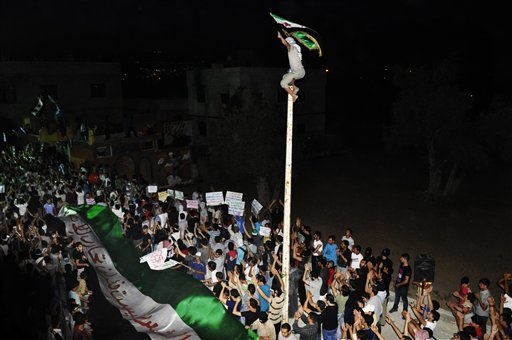
UNITED NATIONS (AP) — Arab nations announced plans Wednesday to go to the U.N. General Assembly and seek approval of a resolution calling for a political transition and establishment of a democratic government in Syria following the Security Council's failure to address the escalating crisis.
Saudi Arabia's Ambassador Abdallah al-Mouallimi and Qatari diplomat Abdulrahman Al-Hamadi announced plans to seek action by the 193-member world body, where there are no vetoes, during a Security Council debate on the Middle East.
Last week, Russia and China again vetoed a Western-backed Security Council resolution aimed at pressuring President Bashar Assad's government to stop the violence by threatening sanctions if he didn't withdraw heavy weapons from populated areas within 10 days.
"The Arab states have decided to head to the General Assembly over the situation in Syria," al-Mouallimi told the council.
Al-Hamadi said the Syrian government's threat to use chemical and biological weapons, and other threats to the region, "have made us feel even further regret with the inability of the Security Council to deal with the Syrian crisis in an effective manner."
Therefore, he said, "the Arab group in New York is going to the General Assembly of the United Nations to deal with the serious threat represented by the Syrian crisis."
The push for action in the General Assembly followed an appeal earlier Wednesday by U.N. Secretary-General Ban Ki-moon for the world to unite in its response to Syria's civil war and do all it can to stop what he called the slaughter taking place there.
"Today, the international community is being tested in Syria," he said in a speech to Bosnia's parliament in Sarajevo, the once devastated city at the heart of the 1992-95 Bosnian war.
"Without unity, there will be more bloodshed. More deadlock means more dead," Ban said. "That is why, here in the heart of a healing Bosnia and Herzegovina, I make a plea to the world: Do not delay. Come together. Act. Act now to stop the slaughter in Syria."
Ban said other countries intervened in Libya and the Ivory Coast to stop widespread killing there, but failed during the Bosnian war to prevent Bosnian Serbs from killing more than 8,000 Muslim Bosniaks in Srebrenica while the town was officially under U.N. protection.
"Quite simply, we must do better in seeing atrocities coming and telling it like it is. We cannot take refuge behind strong words and weak action," he said.
Ban had called for stepped up pressure on the Syrian government but he did not say exactly what the international community should do now.
Unlike Security Council resolutions, General Assembly resolutions are not legally binding, but they can reflect and impact global opinion.
U.N. diplomats said Arab League ministers decided to seek a strong General Assembly resolution at a meeting last weekend.
The diplomats, speaking on condition of anonymity because the text has not been circulated, said it will likely include language on the chemical weapons threat, an endorsement of Annan's peace plan and the guidelines for a political transition adopted at a conference in Geneva last month, a demand to allow humanitarian workers access to the entire country, and possibly a call for other countries to follow Arab League sanctions.
Syria's U.N. Ambassador Bashar Ja'afari accused the Saudis and Qataris of interfering militarily, financially and politically in Syria and shedding "crocodile tears over the suffering of the Syrian people."
He also accused them of "conspiring" against Annan's peace plan and the guidelines for a political transition in order to escalate tensions against Syria and its interests in the General Assembly after they failed to do so in the Security Council.
The General Assembly voted overwhelmingly in February for a resolution backing an Arab League plan calling for Assad to hand power to his vice president and immediately stop the bloody crackdown.